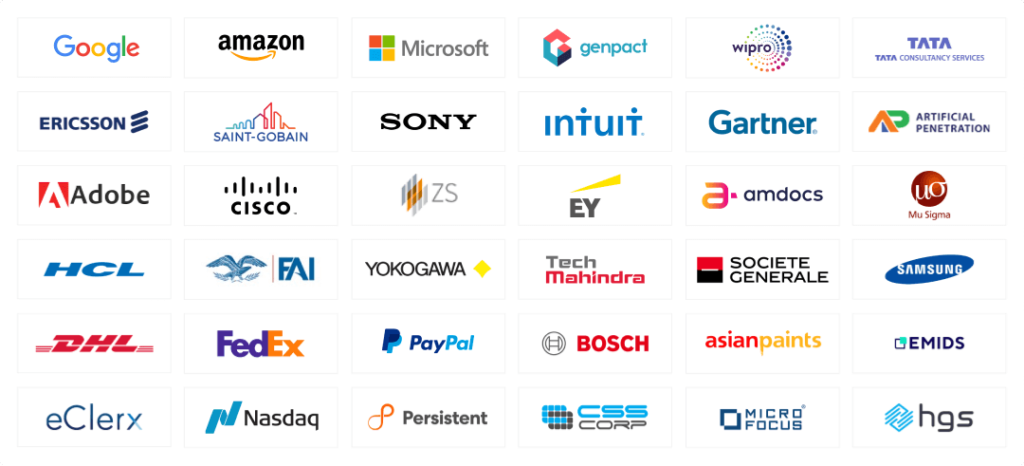Azure DevOps Training in KPHB Hyderabad
Our Best Azure DevOps Training in Hyderabad KPHB provides certification-based learning with hands-on practice projects to help you master Azure DevOps and become a Pro-certified DevOps Professional. Enrolling in Azure DevOps training in Hyderabad with Srish Technologies will ease your learning experience and provides in-depth knowledge of various DevOps tools. Starting from the basics of understanding why DevOps came into existence, you will get complete guidance on how to implement a solution in DevOps. Join now with our 100% Job-oriented Azure DevOps training program with Placements support and land your dream jobs.
Course Highlights
- 75 Hours of Hands-on Course
- Industry Trend Curriculum
- Domain Expert Trainers
- 20 Hrs. of Project Implementation
- Real-time Projects & Scenarios
- 3200+ Happy Students
- Classroom & Live Online Training
- 100% Placement Assistance
- Biweekly Mock Test
- Interview Preparation Sessions
- 1:1 Mentorship
- Resume Building
- Free Course Material
- Life-time Free LMS Access


Azure DevOps Course Overview
We, Srish Technologies is known for the best Azure DevOps Training Institute in KPHB Hyderabad with placement support, offers a comprehensive learning program to explore, practice, and master every concept of Azure-associated DevOps. This Azure DevOps training in kukatpally program is designed to help every individual, irrespective of their academic background, to master and acquire enough skills to clear the interviews on the first attempt. During this Azure DevOps training in Kukatpally, you will walk through the modules of IT Operations and their executions in Development, making you a skilled expert in DevOps.
Demand For DevOps Skills-set
- The Global DevOps market will be close to 30 Billion USD by 2030. That’s huge.
- The adoption of DevOps is growing rapidly across IT companies at 20% CAGR YoY.
- Implying more opportunities for DevOps-skilled professionals. 75% rise in DevOps jobs from the past three years.
- DevOps professionals’ salary starts from 7 LPA in India and is above 100k USD Per Annum.
- DevOps has been listed as one of the Top 5 career opportunities for 3 consecutive years.
Next Batch Starts From
24 July @ 8:00 AM IST
29 July @ 10:00 AM IST
Classroom Training

Our DevOps trainings provides you with best in-class training facilities for all course related to DevOps including DevOps and Azure DevOps.
Online Training

Our Live online sessions conducted by our domain expert trainers are very interactive. You can join our Azure DevOps online training sessions from anywhere in the world at your own convenience.
Want to Become a Successful DevOps Engineer ?
Look no further than Srish Technologies, the Best DevOps Training Institute in Hyderabad.
“Explore our comprehensive DevOps training program which is meticulously designed to equip you with the essential skills and knowledge needed to excel in the rapidly evolving field of DevOps.
Whether you’re a seasoned professional looking to enhance your expertise or a beginner eager to start your journey, our expert-led training programs cater to all levels of proficiency. Register now for practical skills and certification!”
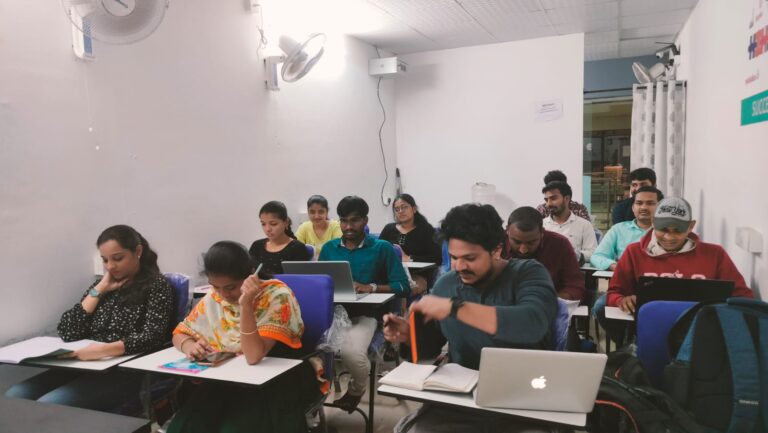
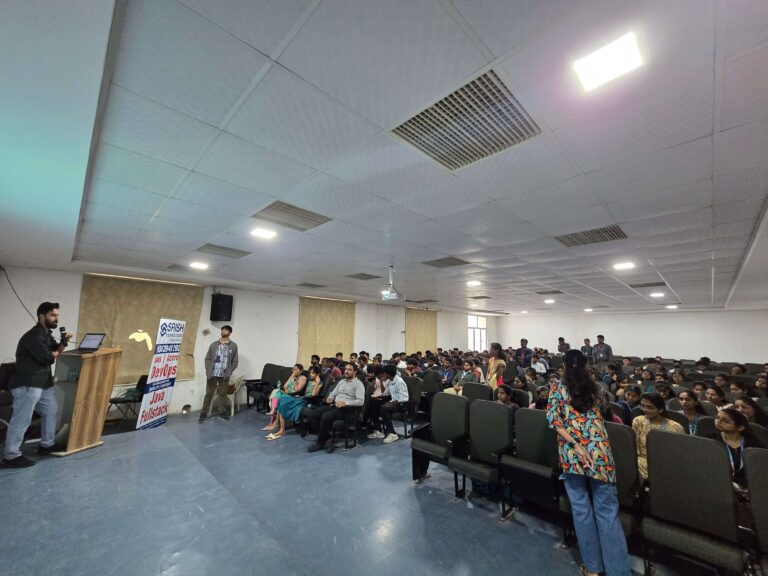
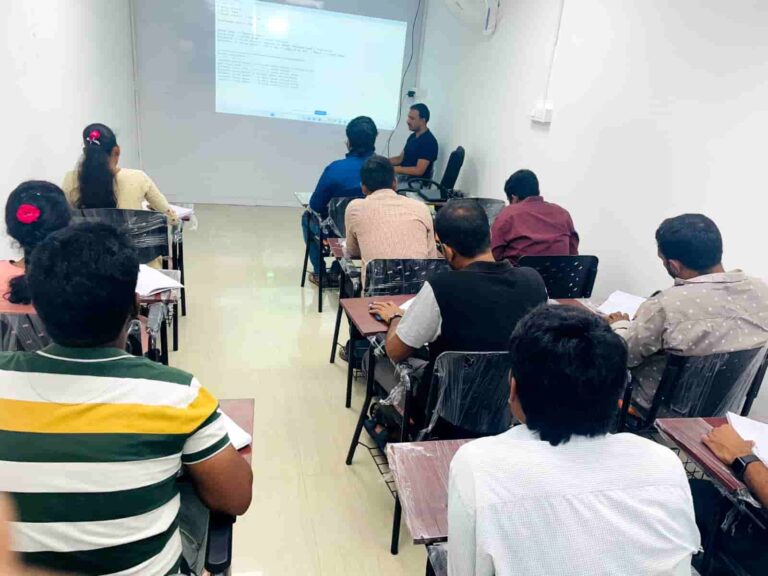
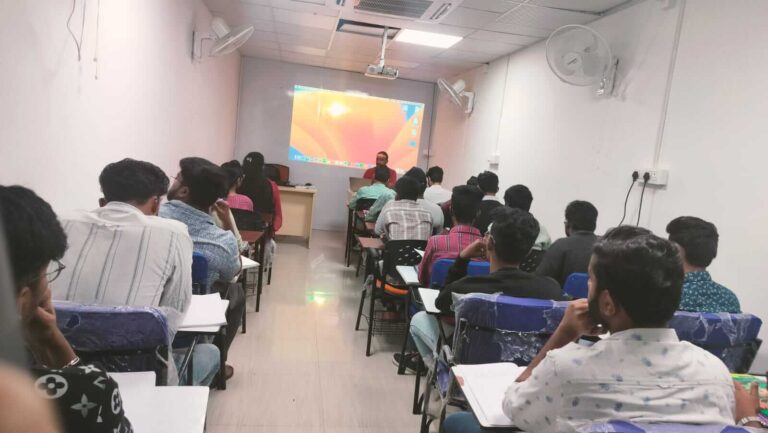
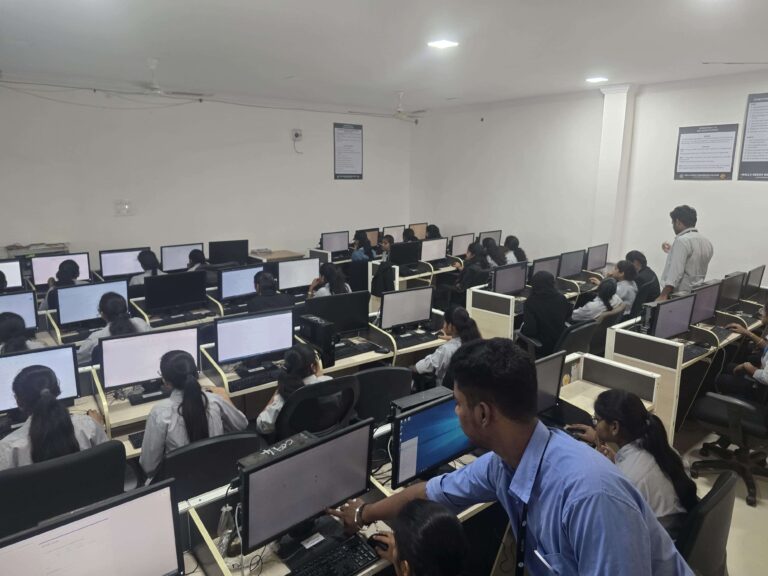






Azure DevOps Training Curriculum
Srish Technologies stands out from the other Azure DevOps training providers in KPHB Hyderabad. Our experts will customize the curriculum with the latest and most demanded concepts that will equip you with the required skills to perform real-time day-to-day on-job activities.
Want learn DevOps with AWS course, then visit here for > AWS DevOps Training.
The following are the default concepts we provide as an outline of the Azure DevOps Course Curriculum:
- Introduction to DevOps
- Overview of DevOps Tools
- Legacy system before DevOps
- DevOps Lifecycle
- Waterfall Model
- Agile Model
1. Datacentre Overview
2. WSL Overview
3. Linux Installation
- Physical Machine
- Virtual Machine
- Cloud Services
- Basic Requirements of installation
4. Basic Commands
5. User Management
- Types of Users in Linux
- Creating and deleting Users and Groups
- Modifying Users profile
- Adding Users into the Groups
- Important system files related to User & Group administration
- The Privileges of Root
- Delegating Root Privileges with Sudo
6. Package Management
- Description of a Repository
- Difference between RPM and YUM
- Configuration of YUM server
- Installing and deleting software packages
- Querying and updating software packages
7. Backup and Recovery
- Introduction to various types of backup media
- Backup and restoring using tar commands
8. File Permissions
- Importance of Permissions
- Types of Permissions
- User level Permissions
- Group level Permissions
- Setting Access Level Permissions on Users & Groups
9. SSH & SCP
- SSH Introduction
- Installation and Configuration
- Different ways to login using SSH
- SCP file Transfer
- Different ways to Copy files
10. Scripting Introduction
- Shell Basics Fundamentals
- Searching and Replacing
- Techniques in files and Folders using grep,find sed,awk etc.
- Bash Shell Syntax Overview
- Using Variables and Loops
- Automation techniques on Manual process
- Introduction to GIT
- Types of Version Control
- GIT Architecture
- GIT Setup
- Local and Remote Repositories
- GIT and GIT-HUB integration
- GIT-HUB Activities
- Web-hooks and Pull Request
- GIT Basics and Advanced Commands
- GIT Branching and Merging Strategies
- GIT Real Time Scenarios
- GitHub account creation
- GitHub Public Repo
- GitHub Private Repo
- GitHub Branching strategies
1. Introduction to Azure Cloud Computing
2. Explanation about Global Infrastructure
3. Azure Networking
- Virtual Network
- Subnets
- Virtual Network NAT
- Defined tables
- Network Security Group
- Static IP Address
4. Azure Compute
- Azure Virtual Machines creation
- Managed disks
- Snapshots
- ARM
5. Azure Load Balancers
- Application Gateway
- Load Balancer
6. Azure Virtual Machine scale set & App service Auto scale
7. Azure Identities and Governance
- IAM users
- IAM groups
- IAM roles and policies
8. Azure Storage
- Blob Storage
- File Storage
9. Azure DNS
- Domain Name space
- Registration
- Hosting Website
- DNS Records
- Introduction to Azure DevOps
• What is Azure DevOps?
• Key features and services
• Comparison with other DevOps tools - Getting Started with Azure DevOps
• Setting Up an Azure DevOps Organization:
• Creating an Azure DevOps account
• Navigating the Azure DevOps portal - Understanding Azure DevOps Services:
• Azure Boards
• Azure Repos
• Azure Pipelines
• Azure Test Plans
• Azure Artifacts - Azure Boards
Work Items:
• Creating and managing work items
• Types of work items (Epics, Features, User Stories, Tasks, Bugs)Boards and Backlogs:
• Configuring boards and backlogs
• Managing sprints and iterationsQueries and Reporting:
• Creating and managing queries
• Dashboards and reporting - Azure Repos
Version Control:
• Introduction to Git and TFVC
• Creating and managing repositoriesBranching and Merging:
• Branch strategies (feature branching, release branching)
• Pull requests and code reviewsRepository Management:
• Setting up policies and permissions
• Managing code quality - Azure Pipelines
CI/CD Fundamentals:
• Concepts of Continuous Integration and Continuous DeploymentCreating Build Pipelines:
• YAML vs Classic Editor
• Tasks and steps in a pipelineCreating Release Pipelines:
• Environments and approvals
• Continuous DeploymentPipeline Integrations:
• Integrating with external tools and services
• Managing pipeline variables and secrets
• Multistage pipelines
• Deployment strategies (BlueGreen, Canary)
• HandsOn Projects - Azure Test Plans
Introduction to Test Plans:
• Overview of testing in Azure DevOpsCreating and Managing Test Cases:
• Creating test plans, test suites, and test cases - Azure Artifacts
Introduction to Package Management:
• Overview of Azure ArtifactsCreating and Managing Feeds:
• Publishing and consuming packagesIntegrating with Pipelines:
• Using artifacts in build and release pipelines
- Introduction with Maven
- Types of Build tools
- Maven Phases
- Installation of Maven
- Maven Configuration
- jar/war project structure
- Creating Projects from Scratch
- Working on Existing Projects
- Introduction to Jenkins
- Jenkins Installation
- User Profile
- User Management
- Plugins Management
- Tools Installation and Configuration
- Job Creation and Builds Setup
- Master – Slave Setup
- Distributed Builds
- Build & Delivery PipelineSetup
- Parameterized Builds
- Web-hooks Integration
- Scheduling Daily and Nightly Builds
- Troubleshooting Jenkins
- Integration with GIT-Hub, Maven, Tomcat, Nexus, Ansible etc.
- Introduction to Nexus
- Installation and Configuration
- Repository Management
- Integration with Maven and Jenkins
- Deploying Artifacts from Jenkins
- Deploying Artifacts from Maven Command line
- Introduction to SonarQube
- Installation and Configuration
- Understanding of Static code, Analysis,PMD, Checkstyle
- Generating Token
- Walkthrough Administration tasks
- Integration with Maven and Jenkins
- Running Sonarfrom Maven and Jenkins
- Explanation about sonar properties
- Docker Introduction
• What is Docker?
• Benefits of Containerization
• Container vs Virtual - Docker Installation and Configuration
• Installing Docker on Different Platforms (Windows, macOS, Linux)
• Post-installation Steps and Docker CLI Configuration
• Docker Desktop vs. Docker Engine
• Troubleshooting Installation Issues - Docker Basics Syntax and Advanced Commands
• Basic Docker Commands (docker run, docker ps, docker stop, docker rm, docker logs)
• Docker Networking Basics (docker network)
• Advanced Docker Commands (docker exec, docker attach, docker-compose, docker swarm)
• Working with Docker CLI vs. Docker Compose - Docker Images
• Understanding Docker Images and Layers
• Creating Docker Images
• Managing Docker Images (docker pull, docker tag, docker rmi)
• Image Optimization and Best Practices - Docker Containers
• Lifecycle of Docker Containers
• Managing Containers (docker start, docker stop, docker restart)
• Container Networking and Ports
• Container Health Checks and Logging - Dockerfile Instructions and Dockerfile Creation
• Dockerfile Syntax and Structure
• Common Instructions (FROM, RUN, COPY, ENTRYPOINT, CMD)
• Building Docker Images from Dockerfiles
• Multi-stage Builds and Advanced Dockerfile Techniques - Docker Registries and Docker Hub
• Introduction to Docker Registries
• Docker Hub Overview and Usage
• Private Registries and Docker Registry Setup
• Pushing and Pulling Images from Registries - Docker Volumes
• Introduction to Docker Volumes
• Creating and Managing Volumes (docker volume create, docker volume inspect)
• Volume Types: Named vs. Anonymous Volumes
• Data Persistence and Backup Strategies
Docker Project 1
• Create custom Docker Image in Local Machine and run docker containers locally
Docker Project 2
• Create custom Docker Image and upload to Azure Container Registry and run docker
containers
Docker Project 3
• Create custom Image and upload to Azure Container Registry using Azure DevOps CI-CD and
run docker containers
- Introduction to Kubernetes
• What is Kubernetes?
• Definition and Purpose
• Brief History and Evolution
• Kubernetes vs. Traditional Deployment Models - Kubernetes Architecture
• Master Node vs. Worker Nodes
• Components of the Master Node (API Server, Scheduler, Controller Manager)
• Components of the Worker Node (Kubelet, Kube Proxy, Container Runtime)
• etcd and its Role - Key Kubernetes Concepts
• Pods
• ReplicaSets
• Namespaces
• Labels and Selectors
• ConfigMaps and Secrets - Kubernetes Terminology
• Cluster
• Node
• Deployment
• Service
• Volume
• Namespace - Azure Kubernetes Service (AKS) Cluster Creation
• Introduction to AKS
• Overview of AKS
• Benefits of Using AKS
• Comparison with Other Kubernetes Services - Prerequisites
• Azure Account Setup
• Azure CLI Installation
• kubectl Installation - Creating an AKS Cluster
• Using Azure Portal (Step-by-Step Walkthrough)
• Using Azure CLI (Commands and Parameters)
• Configuration Options (Scaling, Networking, Security) - Connecting to Your AKS Cluster
• Configuring kubectl
• Verifying Connection - Kubernetes Workloads
Understanding Workloads
• Definition and Purpose
• Types of Workloads
Pods
• Creating and Managing Pods
• Pod Lifecycle
• Multi-container Pods
ReplicaSets
• Purpose and Functionality
• Creating and Managing ReplicaSets
Deployments
• Deployment Strategies
• Rolling Updates and Rollbacks
• Creating and Managing Deployments
StatefulSets
• Purpose and Use Cases
• Differences from Deployments
• Managing StatefulSets
DaemonSets
• Purpose and Use Cases
• Creating and Managing DaemonSets
Jobs and CronJobs
• Running Batch Jobs
• Scheduling Jobs with CronJobs - Kubernetes Services
Introduction to Services
• Purpose of Services
• Types of Services
• ClusterIP Service
• NodePort Service
• LoadBalancer Service
Kubernetes Project 1
• Minikube setup for local Kubernetes Cluster
Kubernetes Project 2
• Deploying 2 Tier Architecture in AKS Cluster
- Introduction to Infrastructure as Code.
- Terraform Installation and configuration.
- Create and destroy infrastructure: Provider,
- Resources, Variables, Outputs.
- Multiple instances of resources: Count
Terraform Project 1
• Terraform project on Docker resources provision
Terraform Project 2
• Terraform project on Azure resources provision
Terraform Project 3
• Terraform HCP project on Azure resources provision using Terraform Cloud
Introduction
• Intro
• Installation & Setup
• Commands
BICEP- Project
BICEP to create Azure resources automatically in Azure DevOps CI-CD
1. Introduction to Ansible
2. Types of Configuration Management tools
- Ansible, Chef, Puppet
3. Ansible Setup
- Installation and Configuration
- Ansible installation Repo
- Different ways to install Ansible
4. SSH Configuration and Root Privileges
- SSH Key Generate
- Password less Connection Setup
- Providing Ansible user Sudo Privileges
- Understanding Sudo Configuration
5. Inventory Management
- Default Inventory
- Inventory Structure and Hierarchy
6. Implementing Playbooks
- Basic Playbook Structure
- Running Playbook
7. Modules in Ansible
- Setup
- Command
- Shell
- User
- File
- Copy
- Yum
- Service
- Debug
8. Running Ad-hoc Commands using Modules
9. Managing Multiple Tasks in Playbook
- Tags
- Registers
- Handlers
10. Managing Variables in Playbooks
- Declaring Variables
- Accessing Variables
11.Ansible Roles
12. Ansible Templates
- Creation of Jinja2 Templates
- Managing Variables for Templates
13. Ansible Projects
Project 1
• Creation of Azure Resources using Ansible Azure Playbook
Project 2
• Managing Azure Resources using Ansible Azure Playbooks
- Introduction to Logging, Alerting, and Monitoring
• Overview and Importance
• Definitions and Key Concepts
• The Role of Logging, Alerting, and Monitoring in IT Operations
• Benefits of Effective Monitoring and Alerting - Key Components
• Logs
• Metrics
• Traces
• Alerts - Azure Monitoring Tools
Azure Insights
• Overview of Azure Insights
• Setting Up Azure Insights
• Key Features and Benefits
Azure Log Monitor
• Introduction to Azure Log Monitor
• Configuring Log Monitor for Data Collection
• Integrating with Azure Services
Azure Log Analytics Workspace
• Overview of Azure Log Analytics
• Creating and Configuring Log Analytics Workspace
• Querying Logs with Kusto Query Language (KQL)
• Visualizing Data and Creating Dashboards
Azure Monitoring
• Using Azure Monitor for Alerts
• Configuring Alerts in Azure Monitor
• Setting Up Action Groups and Notifications
• Alert Rules and Automation - Prometheus and Grafana
Introduction to Prometheus
• Overview of Prometheus
• Key Features and Architecture
• Installing and Configuring Prometheus
Prometheus Metrics Collection
• Configuring Metric Scraping
• Using Prometheus Query Language (PromQL)
• Visualizing Metrics with Prometheus Web UI
Introduction to Grafana
• Overview of Grafana
• Key Features and Integration with Prometheus
• Installing and Configuring Grafana
Creating Dashboards in Grafana
• Building and Customizing Dashboards
• Using Grafana Panels for Visualization
• Setting Up Alerts in Grafana - Application Performance Monitoring (APM) Tools
New Relic
• Introduction to New Relic
• Setting Up New Relic for Application Monitoring
• Key Features: APM, Infrastructure Monitoring, and Synthetic Monitoring
• Creating Dashboards and Alerts in New Relic
Datadog
• Overview of Datadog
• Setting Up Datadog for Comprehensive Monitoring
• Key Features: APM, Log Management, Infrastructure Monitoring
• Creating Dashboards, Alerts, and Monitors in Datadog - Incident Management and Alerting
PagerDuty
Introduction to PagerDuty
• Overview of PagerDuty
• Configuring PagerDuty for Incident Management
• Integrating PagerDuty with Monitoring Tools
• Setting Up Alerting Policies
• Creating and Managing Alerting Rules
• Configuring On-Call Schedules and Escalation Policies
• Incident Response and Resolution Workflow - Troubleshooting Issues
• Pipeline Issues
• Deployment (CI-CD) Issues
• Networking Issues
• Cluster Issues -
Pod Restarting -
Crashloop back errors
• Configuration issues
• Best Practices
Project 1: GIT + Scripting + Azure + Azure DevOps + CI-CD + Prometheus +
Grafana + Container Insights + Azure Container Registry + BICEP
Project 2: Automated CI-CD Multi-Environment Deployment
Project 3: Migration Project.
- Resume Preparation
- Interview Realtime Scenarios
- Interview Questions
- Self-Introduction preparation
- Technical Rounds preparation
- HR Round Salary Negotiation techniques
- Grooming for moving from non-technical to technical Background
- Grooming on Behavioral Skills and Mind Set Change
- Running Notes
- Diagrams
- Documentations
- Recorded Videos
- Scenario based Notes
- Interview Preparation Notes
- Fresher and Experience reference Resume
Azure DevOps Course in kphb Projects
At Srish Technologies, during the Azure DevOps training in KPHB, we ensure every individual executes the DevOps concepts we deliver during the training. By the end of the course, you will have a worthy time experiencing hands-on work on real-time projects.
Learning while you do is a practical approach that will help you to grasp things better and deal with gaining real-time exposure at the earliest.
Benefits with Srish Technologies Classes
- 100% Placement Support
- Weekdays/Weekend LIVE Classes
- One-on-One with Mentors
- Free Demo Classes
- Industry Oriented Projects
- Instructors from MNC’s
- Lab Sessions
- Doubt Clearance Sessions
- Designed by Industry Experts
- Recognized Certification
Azure DevOps Training in Kukatpally Objectives
1. What are the DevOps course outcomes?
By the end of these Azure DevOps training in Kukatpally classes, you will be job-ready and equipped with the essential skills required to become DevOps professional and pursue a robust career.
2. Who can enroll for the DevOps training in Hyderabad?
DevOps training course in Hyderabad is built for every individual who aspires to become a DevOps professional. We have experienced mentors who can deliver training as per the learner's academic background and, in the end, make them experts in DevOps skills.
3. What are the prerequisites to take up the DevOps course?
There are no mandatory prerequisites required to get started to master DevOps. However, we recommend candidates with a basic understanding of Linux and scripting would make it easy and quick to learn DevOps.
4. How to get started with DevOps with a non-IT background?
DevOps training is for every DevOps career aspirant, irrespective of academic background; we deliver everything from the basics and walk you through core concepts, making your learning process easy.
5. How does the DevOps course with job assistance work?
Our devops training in kphb hyderabad helps you to get the right skills, provides resources to understand how the interviews happen at MNCs by conducting mock interviews, and assists you with resume building. You will get everything you need to CLEAR interviews and become job-ready; all you need to do is follow our instructions, submit assignments, practice skills, and be consistent with learning.
6. Do I need to get certified to land a job in MNCs?
Employers are concerned with the right skills to serve the DevOps position, and DevOps certification is an add-on to prove your credibility. Getting certified helps you stand ahead of competitors, showcasing your proven abilities in handling DevOps concepts approved by the authorities.
JOIN THE FREE DEMO TODAY
Get to know more about the course curriculum and trainers expertise.
Register now to Join the free demo today.
Azure DevOps Training Institute in KPHB Reviews
DevOps Training in Kukatpally FAQs
1. Is DevOps a Good Career Option?
Definitely! Since DevOps came into existence, companies' adoption rate of DevOps has increased rapidly. Demand for DevOps indicates it is one of the best future-proof career options of recent times. DevOps professionals are listed among the top ten IT jobs with the best packages in the industry, starting from 7LPA for DevOps freshers in India.
2. Is DevOps easy to learn?
Yes. DevOps is easy for serious aspirants like you who aim to become professionals and build a strong career in DevOps, which is the most promising career opportunity today. Consistent efforts to learn and practice the concepts we deliver in the classroom sessions will make your learning experience easy and fruitful.
3. I don’t have any coding knowledge. Can I learn DevOps?
Yes, you can learn DevOps without prior knowledge of coding. To pursue a career, you need to know a bit about coding, which will be part of your roles and responsibilities. DevOps course by Srish Technologies includes all the essential knowledge, including coding from basics, to make you a 360-degree DevOps professional.
4. Who are the DevOps training Instructors?
All our trainers, instructors and faculty members are highly qualified professionals from the Industry and have at least 10-15 yrs of relevant experience in various domains.
5. What if I miss a Class?
We understand your priorities, and you will get recorded sessions if you miss any ongoing sessions. Irrespective of you attending the classes, the regular session is recorded and sent to the learners' registered email IDs on the same day.
6. What are the job roles I can attend after this DevOps training?
DevOps is a pack of tools that will open the doors for many opportunities. Once you finish the DevOps course in kphb with Srish Technologies, you can apply for the following job roles:
- Reliability Engineer
- Data Analyst
- DevOps Engineer
- Release Manager,
- DevOps Automation Expert
- System Engineer
These are the top job roles in demand. Apart from the above, there are many other job roles you can apply for with the skills you master in this DevOps course.
7. How long will it take to become a DevOps expert?
The more you practice, the more expertise you own. We provide 100% practical learning experience during the course and also provide either two months of a lab for practicals post-training or an internship for two months, which is enough to gain exposure to all the concepts of DevOps. Internship or lab access may vary for different courses.
8. Does Hyderabad have good opportunities for DevOps Professionals?
Hyderabad is one of India's most progressive growing cities, with a rapid inflow of tech giants investing in it. A decade of the timeline shows the developments made in Hyderabad, especially with the IT industry and its supporting areas like lifestyle changes, infrastructure development, diversity of living, etc. MNCs looking towards Hyderabad is an excellent sign of new opportunities. As the demand for DevOps is seen increasing, we can expect a good number of jobs in Hyderabad for skilled DevOps professionals. Anticipating the trend of IT opportunities in and around this city, Srish Technologies developed excellent DevOps training in Hyderabad, providing essential skills to prepare them for the job in advance.
9. Srish Technologies Institute Location
Address: View Location
124, 1st Floor,
Manjeera Majestic Commercial,
JNTU - Hitech City Road,
Kukatpally Housing Board Colony, Kukatpally,
Hyderabad, Telangana 500072
Our Students Works
Our alumni work at reputed tech organizations and promising startups
